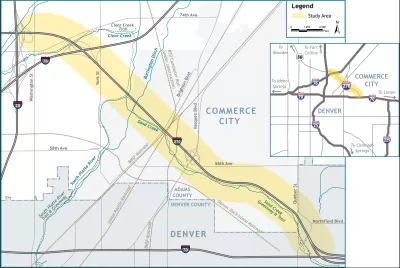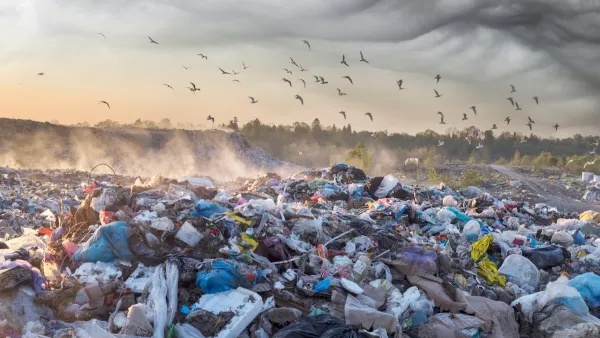The Colorado Department of Transportation has pledged to evaluate direct mitigation measures to reduce the impact of construction projects on nearby communities.

The Colorado Department of Transportation (CDOT) has installed sensors that will track air quality as a project to expand and modernize Interstate 270 gets underway. As reported by Nathaniel Minor, "[t]he sensors will provide the state with enough detailed data to answer a 'big burning question'" of how the construction will impact air quality in surrounding areas.
"Answering this question is especially critical for the southern end of Commerce City, which is adjacent to several pollution-generating highways and large industrial sites like the Suncor refinery." The data could help officials figure out ways to mitigate pollution during construction projects.
Local residents in southern Commerce City express skepticism at the city's efforts, citing years of poor air and water quality in their community. But CDOT says they are taking unprecedented direct mitigation measures that have "pushed the agency into new territory." During the controversial I-70 expansion project, for example, the agency provided "new windows and air conditioning units for more than 200 nearby homes." In this case, measures could include "walls, vegetation and increased transit service."
Meanwhile, residents like Juliet Romero remain concerned about local air quality. "Romero is hopeful CDOT will help expand public transportation in the area — the nearby RTD bus comes only every 30 minutes at peak times — and not just expand the highway."

Planetizen Federal Action Tracker
A weekly monitor of how Trump’s orders and actions are impacting planners and planning in America.

Maui's Vacation Rental Debate Turns Ugly
Verbal attacks, misinformation campaigns and fistfights plague a high-stakes debate to convert thousands of vacation rentals into long-term housing.

Restaurant Patios Were a Pandemic Win — Why Were They so Hard to Keep?
Social distancing requirements and changes in travel patterns prompted cities to pilot new uses for street and sidewalk space. Then it got complicated.

In California Battle of Housing vs. Environment, Housing Just Won
A new state law significantly limits the power of CEQA, an environmental review law that served as a powerful tool for blocking new development.

Boulder Eliminates Parking Minimums Citywide
Officials estimate the cost of building a single underground parking space at up to $100,000.

Orange County, Florida Adopts Largest US “Sprawl Repair” Code
The ‘Orange Code’ seeks to rectify decades of sprawl-inducing, car-oriented development.
Urban Design for Planners 1: Software Tools
This six-course series explores essential urban design concepts using open source software and equips planners with the tools they need to participate fully in the urban design process.
Planning for Universal Design
Learn the tools for implementing Universal Design in planning regulations.
Heyer Gruel & Associates PA
JM Goldson LLC
Custer County Colorado
City of Camden Redevelopment Agency
City of Astoria
Transportation Research & Education Center (TREC) at Portland State University
Jefferson Parish Government
Camden Redevelopment Agency
City of Claremont





























